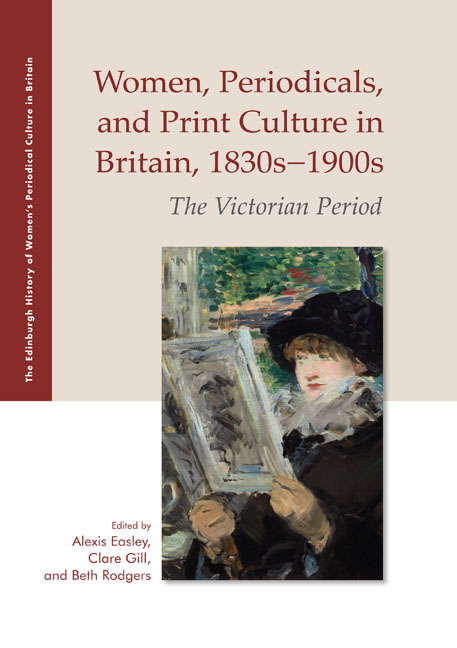Book contents
- Frontmatter
- Contents
- List of Illustrations
- Acknowledgments
- Introduction: Women, Periodicals, and Print Culture in the Victorian Period
- Part I (Re)Imagining Domestic Life
- Part II Constructing Modern Girls and Young Women
- Part III Women and Visual Culture
- Part IV Making Space for Women
- Part V Constructing Women Readers and Writers
- Part VI Intervening in Political Debates
- Intervening in Political Debates: Introduction
- 30 Brewing Storms of War, Slavery, and Imperialism: Harriet Martineau's Engagement with the Periodical Press
- 31 Mary Smith (1822–1889): A Radical Journalist under Many Guises
- 32 In Time of Disturbance: Political Dissonance and Subversion in Violet Fane's Contributions to the Lady's Realm
- 33 ‘Our Women in Journalism’: African-American Women Journalists and the Circulation of News
- 34 The Response of the Late Victorian Feminist Press to Same-Sex Desire Controversies
- 35 Wings and the Woman's Signal: Reputation and Respectability in Women's Temperance Periodicals, 1892–1899
- Notes on Contributors
- Index
- Plate section
30 - Brewing Storms of War, Slavery, and Imperialism: Harriet Martineau's Engagement with the Periodical Press
from Part VI - Intervening in Political Debates
Published online by Cambridge University Press: 25 October 2019
- Frontmatter
- Contents
- List of Illustrations
- Acknowledgments
- Introduction: Women, Periodicals, and Print Culture in the Victorian Period
- Part I (Re)Imagining Domestic Life
- Part II Constructing Modern Girls and Young Women
- Part III Women and Visual Culture
- Part IV Making Space for Women
- Part V Constructing Women Readers and Writers
- Part VI Intervening in Political Debates
- Intervening in Political Debates: Introduction
- 30 Brewing Storms of War, Slavery, and Imperialism: Harriet Martineau's Engagement with the Periodical Press
- 31 Mary Smith (1822–1889): A Radical Journalist under Many Guises
- 32 In Time of Disturbance: Political Dissonance and Subversion in Violet Fane's Contributions to the Lady's Realm
- 33 ‘Our Women in Journalism’: African-American Women Journalists and the Circulation of News
- 34 The Response of the Late Victorian Feminist Press to Same-Sex Desire Controversies
- 35 Wings and the Woman's Signal: Reputation and Respectability in Women's Temperance Periodicals, 1892–1899
- Notes on Contributors
- Index
- Plate section
Summary
HARRIET MARTINEAU'S IMPACT on the nineteenth-century periodical press is not only indicative of her importance as a writer but also as a public intellectual with substantial political influence. Her career spanned almost sixty years, during which time she gained access to British and American government figures alike, from prime ministers and MPs to presidents, governors, and senators. Valerie Sanders has recently argued that the way in which Martineau occupied the journalistic space to respond primarily to topical issues makes her ‘articles a barometer of contemporary debate, and thus a valuable resource for social and literary historians’ (2017: 188). Indeed, as Linda Peterson argues in Becoming a Woman of Letters, ‘Influence in the public sphere, influence on society and government – these could be most readily achieved through periodical publication’ (2009: 69). Martineau accomplished her journalism ‘with the broad perspectives, sophisticated intellect, and shrewd political insights of one who was herself an active player in the period whose history she recorded’ (Logan 2010: 3). Given her active engagement as both an historian and an early sociologist, Martineau was a distinct and influential voice in the nineteenth-century periodical press.
Martineau's literary career was diverse: she composed over two thousand journal articles and took part in every aspect of the writing profession, from editing and reviewing to fiction and history writing. She participated in the financial side of the publishing world as well, not only by taking charge of her own accounts but also by holding the mortgage of the Westminster Review, which enabled her to maintain a significant investment, financially as well as intellectually, in one of the most influential radical periodicals of the century. Peterson calls her the ‘quintessential Victorian woman of letters – working in multiple media, managing the literary and financial aspects of her career, and successfully filling the role of dotoressa to the nation’ (2009: 61). Alexis Easley likewise notes that early on Martineau ‘helped to crystallize a new definition of women's authorship: as a private yet politicized activity that would enable women to exert influence on key social issues’ (2004: 35).
Throughout her career, Martineau maintained a conviction that her role was to educate her readership. In her Autobiography (1877; written in 1855), she recounts an 1832 conversation with Charles Fox, who, having initially shown enthusiasm for her economics series, was drawing back. She responded, ‘The people want this book, and they shall have it’ (1877: 144).
- Type
- Chapter
- Information
- Women, Periodicals and Print Culture in Britain, 1830s–1900sThe Victorian Period, pp. 489 - 501Publisher: Edinburgh University PressPrint publication year: 2019



